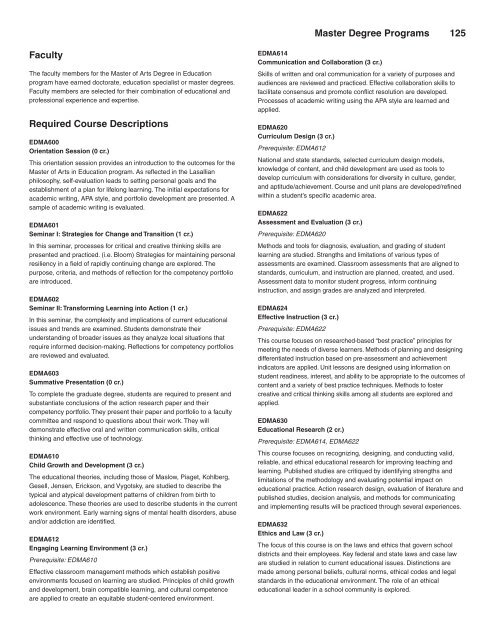& Student Handbook - Saint Mary's University of Minnesota
& Student Handbook - Saint Mary's University of Minnesota
& Student Handbook - Saint Mary's University of Minnesota
Create successful ePaper yourself
Turn your PDF publications into a flip-book with our unique Google optimized e-Paper software.
Master Degree Programs 125<br />
Faculty<br />
The faculty members for the Master <strong>of</strong> Arts Degree in Education<br />
program have earned doctorate, education specialist or master degrees.<br />
Faculty members are selected for their combination <strong>of</strong> educational and<br />
pr<strong>of</strong>essional experience and expertise.<br />
Required Course Descriptions<br />
EDMA600<br />
Orientation Session (0 cr.)<br />
This orientation session provides an introduction to the outcomes for the<br />
Master <strong>of</strong> Arts in Education program. As reflected in the Lasallian<br />
philosophy, self-evaluation leads to setting personal goals and the<br />
establishment <strong>of</strong> a plan for lifelong learning. The initial expectations for<br />
academic writing, APA style, and portfolio development are presented. A<br />
sample <strong>of</strong> academic writing is evaluated.<br />
EDMA601<br />
Seminar I: Strategies for Change and Transition (1 cr.)<br />
In this seminar, processes for critical and creative thinking skills are<br />
presented and practiced. (i.e. Bloom) Strategies for maintaining personal<br />
resiliency in a field <strong>of</strong> rapidly continuing change are explored. The<br />
purpose, criteria, and methods <strong>of</strong> reflection for the competency portfolio<br />
are introduced.<br />
EDMA602<br />
Seminar II: Transforming Learning into Action (1 cr.)<br />
In this seminar, the complexity and implications <strong>of</strong> current educational<br />
issues and trends are examined. <strong>Student</strong>s demonstrate their<br />
understanding <strong>of</strong> broader issues as they analyze local situations that<br />
require informed decision-making. Reflections for competency portfolios<br />
are reviewed and evaluated.<br />
EDMA603<br />
Summative Presentation (0 cr.)<br />
To complete the graduate degree, students are required to present and<br />
substantiate conclusions <strong>of</strong> the action research paper and their<br />
competency portfolio. They present their paper and portfolio to a faculty<br />
committee and respond to questions about their work. They will<br />
demonstrate effective oral and written communication skills, critical<br />
thinking and effective use <strong>of</strong> technology.<br />
EDMA610<br />
Child Growth and Development (3 cr.)<br />
The educational theories, including those <strong>of</strong> Maslow, Piaget, Kohlberg,<br />
Gesell, Jensen, Erickson, and Vygotsky, are studied to describe the<br />
typical and atypical development patterns <strong>of</strong> children from birth to<br />
adolescence. These theories are used to describe students in the current<br />
work environment. Early warning signs <strong>of</strong> mental health disorders, abuse<br />
and/or addiction are identified.<br />
EDMA612<br />
Engaging Learning Environment (3 cr.)<br />
Prerequisite: EDMA610<br />
Effective classroom management methods which establish positive<br />
environments focused on learning are studied. Principles <strong>of</strong> child growth<br />
and development, brain compatible learning, and cultural competence<br />
are applied to create an equitable student-centered environment.<br />
EDMA614<br />
Communication and Collaboration (3 cr.)<br />
Skills <strong>of</strong> written and oral communication for a variety <strong>of</strong> purposes and<br />
audiences are reviewed and practiced. Effective collaboration skills to<br />
facilitate consensus and promote conflict resolution are developed.<br />
Processes <strong>of</strong> academic writing using the APA style are learned and<br />
applied.<br />
EDMA620<br />
Curriculum Design (3 cr.)<br />
Prerequisite: EDMA612<br />
National and state standards, selected curriculum design models,<br />
knowledge <strong>of</strong> content, and child development are used as tools to<br />
develop curriculum with considerations for diversity in culture, gender,<br />
and aptitude/achievement. Course and unit plans are developed/refined<br />
within a student’s specific academic area.<br />
EDMA622<br />
Assessment and Evaluation (3 cr.)<br />
Prerequisite: EDMA620<br />
Methods and tools for diagnosis, evaluation, and grading <strong>of</strong> student<br />
learning are studied. Strengths and limitations <strong>of</strong> various types <strong>of</strong><br />
assessments are examined. Classroom assessments that are aligned to<br />
standards, curriculum, and instruction are planned, created, and used.<br />
Assessment data to monitor student progress, inform continuing<br />
instruction, and assign grades are analyzed and interpreted.<br />
EDMA624<br />
Effective Instruction (3 cr.)<br />
Prerequisite: EDMA622<br />
This course focuses on researched-based “best practice” principles for<br />
meeting the needs <strong>of</strong> diverse learners. Methods <strong>of</strong> planning and designing<br />
differentiated instruction based on pre-assessment and achievement<br />
indicators are applied. Unit lessons are designed using information on<br />
student readiness, interest, and ability to be appropriate to the outcomes <strong>of</strong><br />
content and a variety <strong>of</strong> best practice techniques. Methods to foster<br />
creative and critical thinking skills among all students are explored and<br />
applied.<br />
EDMA630<br />
Educational Research (2 cr.)<br />
Prerequisite: EDMA614, EDMA622<br />
This course focuses on recognizing, designing, and conducting valid,<br />
reliable, and ethical educational research for improving teaching and<br />
learning. Published studies are critiqued by identifying strengths and<br />
limitations <strong>of</strong> the methodology and evaluating potential impact on<br />
educational practice. Action research design, evaluation <strong>of</strong> literature and<br />
published studies, decision analysis, and methods for communicating<br />
and implementing results will be practiced through several experiences.<br />
EDMA632<br />
Ethics and Law (3 cr.)<br />
The focus <strong>of</strong> this course is on the laws and ethics that govern school<br />
districts and their employees. Key federal and state laws and case law<br />
are studied in relation to current educational issues. Distinctions are<br />
made among personal beliefs, cultural norms, ethical codes and legal<br />
standards in the educational environment. The role <strong>of</strong> an ethical<br />
educational leader in a school community is explored.
















